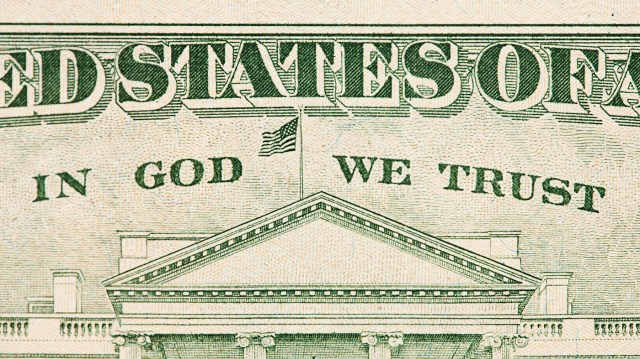
The First Amendment to the U.S. Constitution says that the country shall have no official religion, and Americans have been debating where to draw the line between religion and government since the country’s founding. The debate recently resurfaced with three new Supreme Court rulings over religious symbols on public property, prayer in public schools and state subsidies for religious schools.
Pew Research Center surveys in recent years have shown that far more Americans support than oppose the separation of church and state, although there sometimes are divisions on these questions by political identity and religious affiliation.
Here are 10 facts about some of the connections between religion and government in the U.S. – and the public’s current views on the matter – based on previously published analyses by the Center.
Pew Research Center conducted this analysis to explore Americans’ attitudes about the relationship between church and state in the United States. It draws on a variety of studies the Center has published in recent years. These studies are based on a range of sources, including an original analysis of state constitutions and congressional data collected by CQ Roll Call. Statements about presidents’ religious affiliations are based on an analysis of information from sources including the Miller Center, the University of Virginia, PBS’s “God in the White House,” and the Harry S. Truman Library and Museum.
Methodology for each Pew Research Center survey can be found through the links in the analysis. Everyone who took part in the surveys is a member of the Center’s American Trends Panel (ATP), an online survey panel that is recruited through national, random sampling of residential addresses. This way nearly all U.S. adults have a chance of selection. The survey is weighted to be representative of the U.S. adult population by gender, race, ethnicity, partisan affiliation, education and other categories. Read more about the ATP’s methodology.
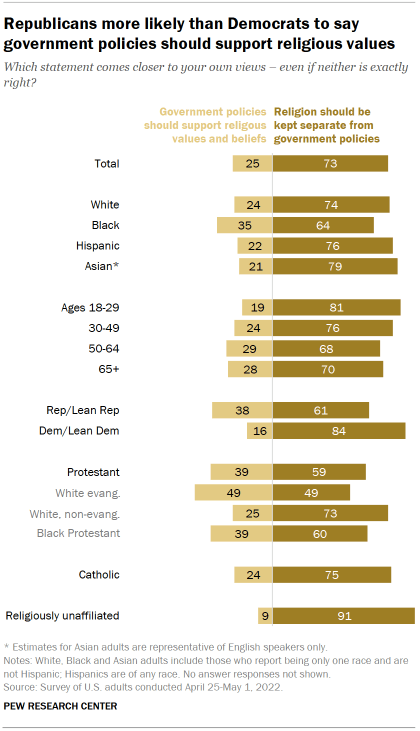
Nearly three-quarters of U.S. adults (73%) say religion should be kept separate from government policies, according to a survey conducted in spring 2022. Just 25% say government policies should support religious values and beliefs. While majorities of both Democrats and Democratic-leaning independents (84%) and Republicans and Republican leaners (61%) say religion should be kept separate from government policies, Republicans are far more likely to say government should support religious values (38% vs. 16%).
About four-in-ten Protestants (39%) say government policies should support religious values and beliefs, compared with 24% of Catholics and 9% of religiously unaffiliated adults – those who describe their religious identity as atheist, agnostic or nothing in particular. White evangelical Protestants are split, with 49% saying that government policies should support religious values and an identical share saying they should be kept separate from religion.
The Johnson Amendment limits political activity by religious organizations, and most Americans (70%) want churches and other houses of worship to stay out of politics, according to a 2021 analysis. Still, a survey conducted during the presidential race in July 2020 found that some U.S. adults who had attended religious services in the month prior or watched services online said they had heard sermons expressing support for then-President Donald Trump (9%) or then-candidate Joe Biden (6%), while others had heard sermons expressing opposition to Trump (7%) or Biden (4%). Meanwhile, four-in-ten had heard sermons discussing the importance of voting, protesting or other forms of political engagement.
The Supreme Court ruled in 1962 that it’s unconstitutional for a teacher to lead a class in prayer at a public school, but three-in-ten U.S. adults said in a March 2021 survey that public school educators should be allowed to do this. A considerably larger share of Americans (46%) said teachers in public schools should not be allowed to lead students in any kind of prayers, with Democrats twice as likely as Republicans to say this (60% vs. 30%). Another 24% did not prefer either option.
Among U.S. public school students ages 13 to 17, 41% said in a 2019 survey that it’s appropriate for a teacher to lead a class in prayer, including 29% of teens who knew that this practice was banned but said it was acceptable nevertheless.
This year, the Supreme Court decided another case that involved prayer at public schools. In that case, the high court ruled that a high school football coach in Bremerton, Washington, had a constitutional right to pray at midfield following games.
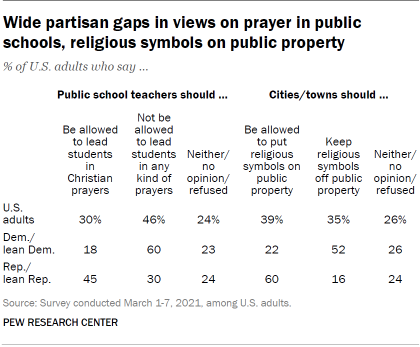
Americans are divided on whether local governments should be allowed to put religious symbols on public property, according to the same March 2021 survey. Nearly four-in-ten U.S. adults (39%) say cities and towns should be allowed to do this, while 35% say religious symbols should be kept off public property. Roughly a quarter (26%) don’t favor either option. While some Supreme Court cases have determined that religious displays on government property are constitutional in certain contexts, other cases have found that such displays can be endorsements of religion, violating the First Amendment.
While the U.S. Constitution does not mention God, nearly all state constitutions reference either God or the divine, according to a 2017 analysis. God also appears in the Declaration of Independence, the Pledge of Allegiance and on U.S. currency.
Christmas Day is the only federal holiday that’s also a religious holiday, although many Americans view Christmas as a cultural holiday, too. Congress made Christmas – along with the Fourth of July, Thanksgiving and New Year’s Day – an unpaid holiday for the federal D.C. workforce in 1870; a later bill extended these as paid vacation days for all government employees. Courts have upheld Christmas Day’s constitutionality, arguing that federal office closures do not coerce citizens to engage in religious activities. Efforts to recognize other religious holidays, such as Muslim Eid al-Fitr, have been unsuccessful to date.
Almost all U.S. presidents, including Joe Biden, have been Christian. Biden is only the second Catholic president (after John F. Kennedy), while the vast majority of others have been Protestant – most often Episcopalian or Presbyterian. Two of the most famous presidents, Thomas Jefferson and Abraham Lincoln, had no formal religious affiliation. Most presidents have been sworn in with a Bible, and they traditionally seal their oath of office with the phrase “so help me God.” Roughly half of Americans feel it is either very (20%) or somewhat (32%) important for a president to have strong religious beliefs (even if they are different from their own), according to a survey conducted in February 2020.
Congress has always been overwhelmingly Christian, and roughly nine-in-ten representatives (88%) in the current Congress – including 99% of Republicans and 78% of Democrats – identify as Christian, according to a January 2021 analysis. Congress is both more heavily Protestant than the U.S. population overall (55% vs. 40%) and more heavily Catholic (30% vs. 21%).
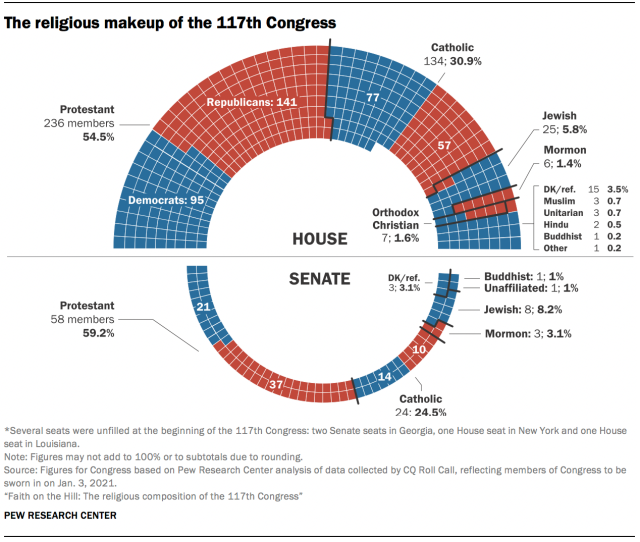
The Constitution guarantees that religion can never be a requirement for holding public office, but most Americans don’t know this, according to a 2019 Pew Research Center survey. When asked in a multiple choice question what the Constitution says about religion, only 27% of adults are able to correctly identify that “no religious test” is necessary to hold public office. Many U.S. adults incorrectly select that the Constitution requires federal officeholders to affirm that all men are endowed by their Creator with certain inalienable rights (15%), that the Constitution requires federal officeholders to be sworn in on the Holy Bible (12%), or that the Constitution says nothing about religion as it relates to federal officeholders (13%). Another 31% say they are not sure what the Constitution says about this.
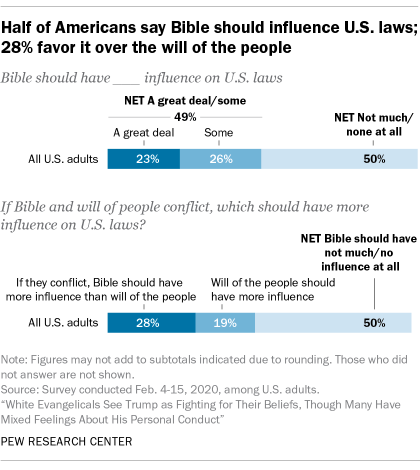
Americans are divided on the extent to which the country’s laws should reflect biblical teachings. Roughly half of adults say the Bible should influence U.S. laws either a great deal (23%) or some (26%), and more than a quarter (28%) say the Bible should prevail over the will of the people if the two are at odds, according to a February 2020 survey. Half of Americans, meanwhile, say the Bible shouldn’t influence U.S. laws much (19%) or at all (31%).
Note: This is an update of a post originally published July 16, 2020.




